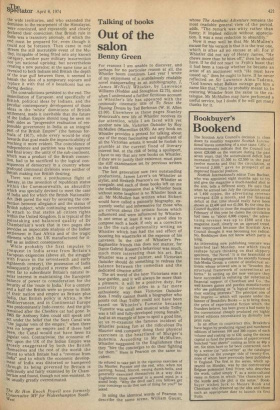Talking of books
Out of the salon
Benny Green
For reasons I am unable to discover, and perhaps for no particular reason at all, the Whistler boom continues. Last year I wrote
of my enjoyment of a scandalously readable novel masquerading as an autobiography, I, James McNeill Whistler, by Lawrence
Williams (Hodder and Stoughton £2.75), since when I understand a further fictitious account ot Whistler's life has appeared with the
ominously cinematic title of To Seize the Passing Dream by Ted Berkman (W. H. Allen
£3.00). Elsewhere in these pages Stanley Weintraub's new life of Whistler receives its due attention, while I am faced with yet
another new life, Victorian Outsider by Roy
McMullen (Macmillan £4.95). As any book on Whistler provides a pretext for talking about one of the most fascinating and significant of all the Victorian artists, it would be foolish to grumble at the current flood of literary interest but, at the risk of being a spoilsport, I have to say that any new books on Whistler, if they are to justify their existence, must pass the stiff examination set by previous writers in the field.
The last generation saw two outstanding productions, James Layer's on Whistler as stylist, and Hesketh Pearson's on Whistler as renegade, and each of these books left on me the indelible impression that a Whistler book
without some laughter is no Whistler book at all. Mr McMullen has written what Sickert would have called a painterly biography, ex tremely useful and informative for those who are curious about the artistic forces which influenced and were influenced by Whistler.
In one sense at least it was a good idea to compose such a book. if only as a corrective to the the cult-of-personality writing on Whistler which has had the sad effect of boosting his wisecracks at the expense of his canvases. In the case of Whistler's Pre Raphaelite friends this does not matter, for Dante Gabriel Rossetti's behaviour was much, much more interesting than his art. But
Whistler was a real painter, and Victorian Outsider should do something to redress the balance between the comedian and the dedicated creative artist.
The art world of the later Victorians was a bear-garden, and it will always be more than a pleasure, it will be a positive duty, for posterity to take sides in a far more
enthusiastic way than Victorian Outsider
does. I really cannot thank a biographer who points out that Trilby could not have been based on Whistler's Fumette because "Fumette was small and musical while Trilby was a tall and fully-develoPed young female." And as an example of how to spoil a good line,
let us re-examine the famous incident of Whistler poking fun, at the ridiculous Du
Maurier and company doing their physical exercises in the heartland of Murger's Bohemia. According to Mr McMullen, Whistler suggested to the Englishmen that they "hire the concierges to do their fighting for them." Here is Pearson on the same incident:
He refused to take part in the vigorous exercises of Du Maurier, Poynter and the rest, who, when not painting, boxed, fenced, swung dumb-bells, and generally exercised themselves in a way that Englishmen think essential to a sound mind in a sound body. "Why the devil can't you fellows get your concierge to do that sort of thing for you?" he asked.
In using the identical words of Pearson to describe the same scene, William Gaunt, whose The Aesthetic Adventure remains the most readable general view of the period, adds, "The remark was witty rather than funny; it implied ridicule without appreciation. It was a neat reduction to absurdity."
Now it may well be that Mr McMullen's excuse for his version is that it is the true one, which is after all no excuse at all. For if Whistler did not say of Henry James, "He chews more than he bites off," then he should have. If he did not react to Frith's boast that it had been a toss-up whether he became an artist of an auctioneer with "He must have tossed up," then he ought to have. If he never reflected on Sir Lawrence Alma-Tadema, "God knows what Balkan outrage got him a name like that," then he probably meant to. In restoring Whistler from the salon to the catalogue, Mr McMullen may have performed a useful service, but I doubt if he will get many thanks for it.


























 Previous page
Previous page